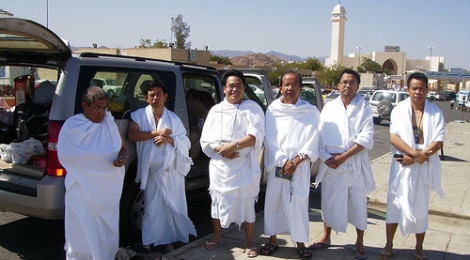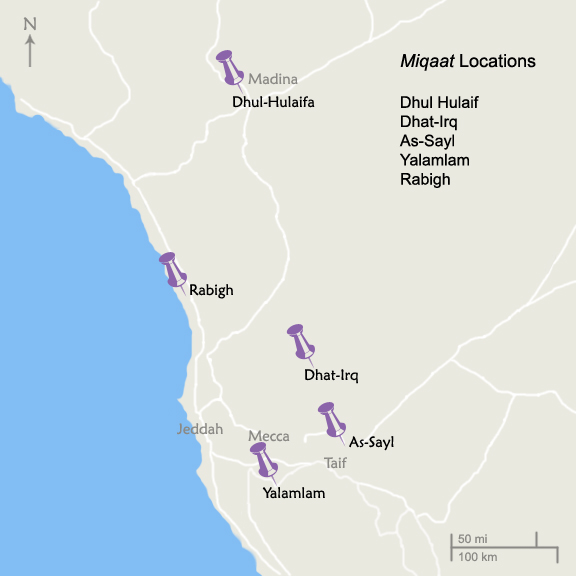
Ihram and intention
Ihram
Ihram refers to, but is not limited to, the clothing worn while performing hajj and umrah; it is the ‘state’ that one is in while performing these acts and a set of rules and regulations must be followed while in this state. Cut your nails, remove unwanted hair and perform ghusl before wearing your ihram.
- For women, the ihram is their normal state of dress according to the Quran and sunnah. The face is left uncovered.
- For men, it is two pieces of white unstitched cotton cloth. One is tied around the waist and the other is wrapped around the torso. Men are not allowed to cover their ankles. Headgear and underwear is not allowed.
- There are no special prayers to be performed after wearing the ihram.
- No use of any products containing fragrance such as soap, shampoo, perfume, lotion or toothpaste. You may shower using just water or fragrance free products.
- No cutting of the hair or nails. You may comb your hair, but do it carefully so as to break as few as possible.
- You may not harm, hunt or kill any living creature, including game, insects and pests.
- No intercourse.
- Taking a shower, changing your clothes and in general keeping yourself clean is allowed. Please try to do so.
- Be patient, helpful and charitable. Do not indulge in fighting, arguing and backbiting.
Ihram has to be worn and the intention has to be made at a certain perimeter around Mecca. This perimeter is called miqaat. As it happens, however, you will probably pass over miqaat in a plane while flying to Jeddah. For this reason, you will wear your ihram before boarding the flight to Jeddah. The pilot will announce when you are flying over it. At this point, the intention must be made, and you are now under the restrictions of the ihram.
- Miqaat Locations (Click to enlarge)
Intention
As with all obligatory acts, the intention must be made. The following is to be said out loud:
Labbayk Allahumma umratan.
(O Allah here I am performing umrah.)
Just in case you are unable to complete your hajj for any reason such as illness, add the following stipulation to your intention:
Fa in habasani haabisun, fa mahilli haithu habastani.
(Thus, if I am hindered by any obstacle, then my place of conclusion is where You have held me.)
This is the time to start reciting the talbiyah loudly, as much as possible:
Labbayk Allahumma labbayk. Labbayk laa shareeka laka labbayk. Innal hamda wan ne mata laka wal mulk. Laa shareeka lak.
(Here I am O Allah, here I am. Here I am, You have no partner, here I am. Verily, all praise, grace and dominion are Yours, You have no partner.)






I need information of fragrance free tooth paste name and which shop i will buy,
I am planning to go hajj on sep22nd 2014.
JZK
Rakhshan Shamim
AOA Rakhshan, I have not managed to find any fragrance free toothpastes in the market. As I mentioned in the blog, hajis took tiny bottles/jars or ziplocks containing baking soda or salt that they used instead of toothpaste. Others used miswaak. Hope this helps. Thank you and have a wonderful hajj, IA!